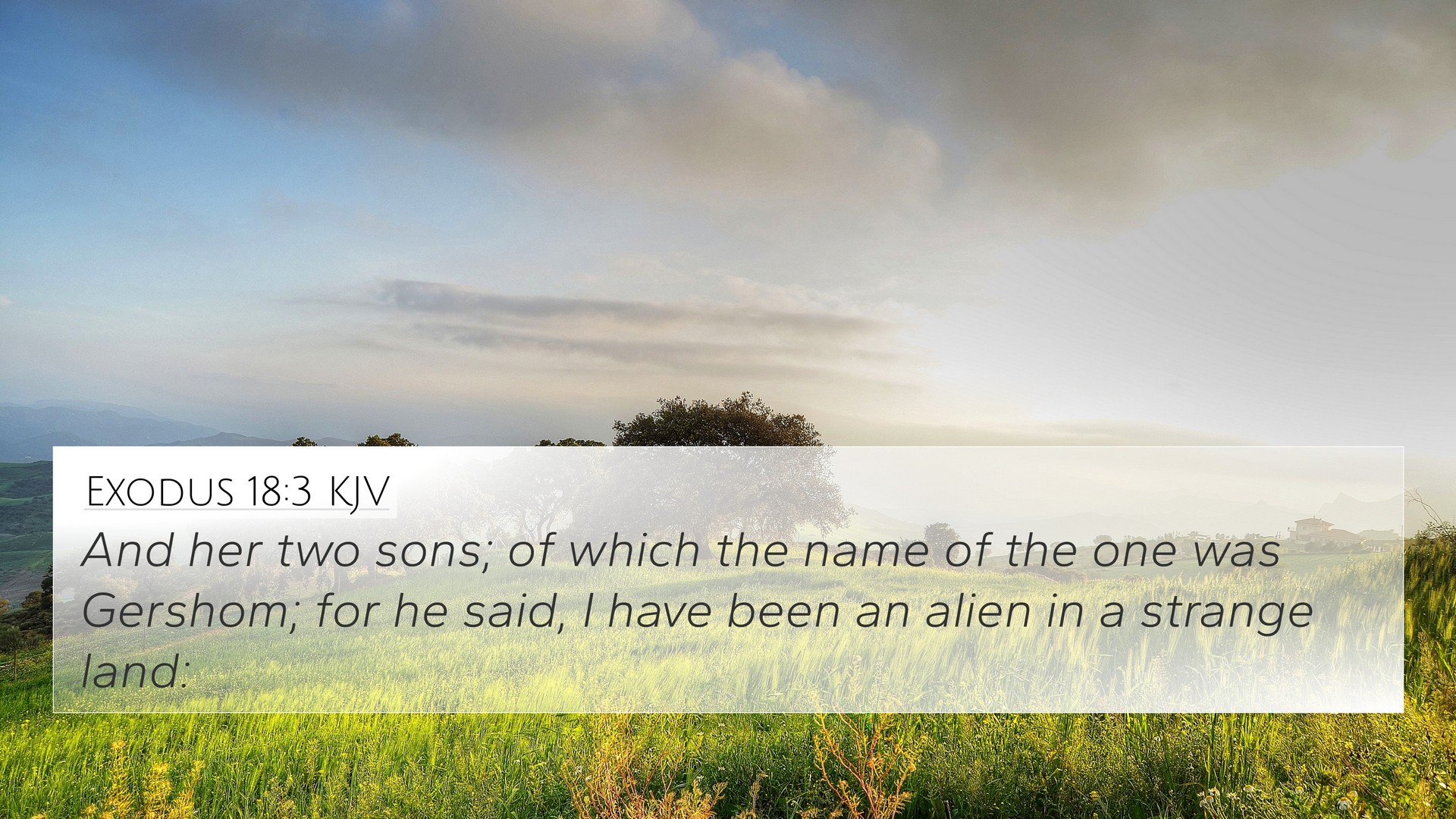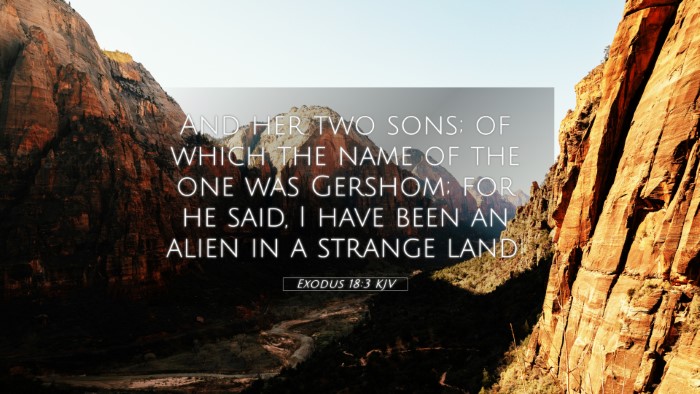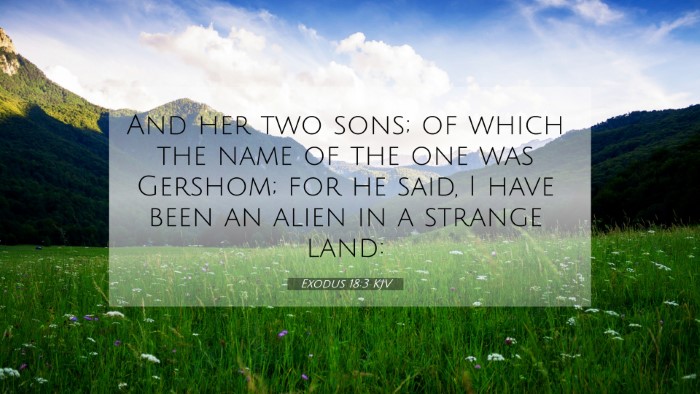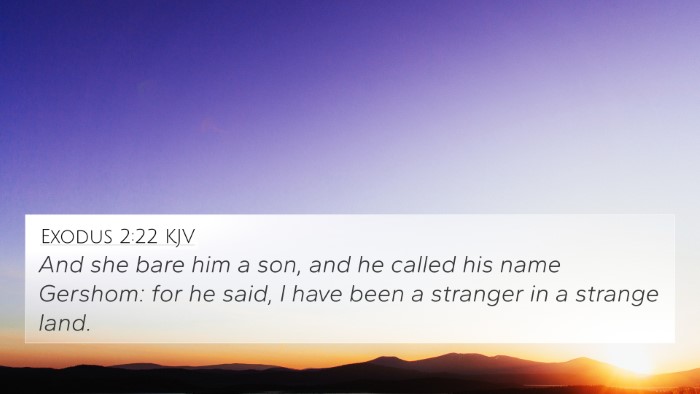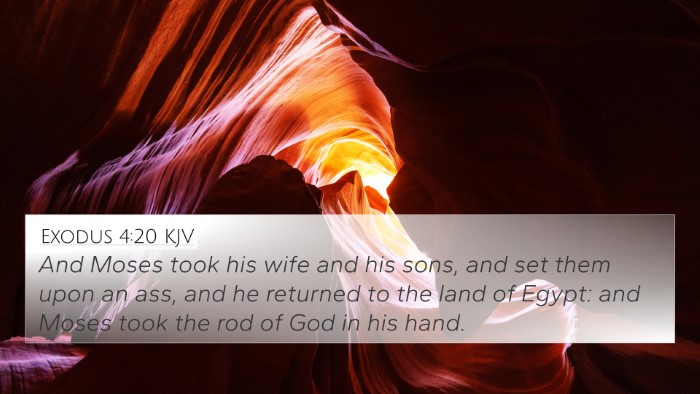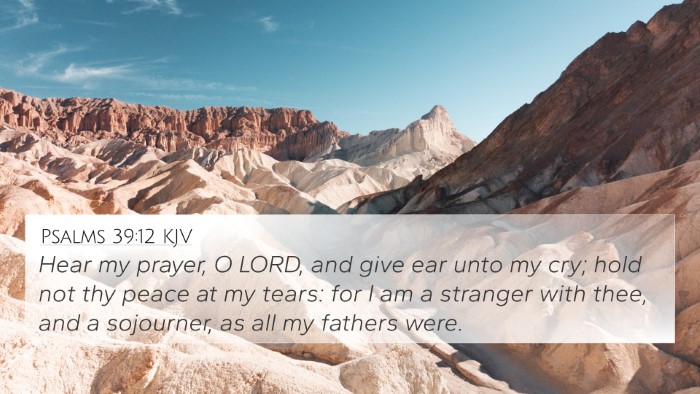Understanding Exodus 18:3
Exodus 18:3 states: "And her two sons; of which the name of the one was Gershom; for he said, I have been an alien in a strange land."
This verse is part of a larger narrative concerning Moses and the significant events following the Exodus from Egypt. It provides insight into Moses' personal life and the implications of his journey, as well as the names of his sons, which reflect his experiences.
Insights from Public Domain Commentaries
Matthew Henry's Commentary
According to Matthew Henry, the mention of Moses's sons, Gershom and Eliezer, serves to highlight the trials and challenges Moses faced during his time in Midian. Gershom, which means "a stranger there," symbolizes Moses's feelings of being an alien in a foreign land after fleeing Egypt. This sheds light on the transformative journey of Moses and illustrates his transition from prince to shepherd. Furthermore, it signifies God's provision in his life during this phase, preparing him for his later role as a leader of the Israelites.
Albert Barnes' Notes on the Bible
Albert Barnes emphasizes the importance of the names given to Moses's sons as reflective of his circumstances. Gershom's name reflects the reality of Moses's life at that time, and it acknowledges his own struggles. His time in Midian is marked by personal exile and a deep sense of separation from his roots. This duality in naming also serves as a reminder that God often uses challenging circumstances to shape our character and destiny.
Adam Clarke's Commentary
Adam Clarke points out that Moses’s naming of his sons is an act of remembrance and testimony of God’s faithfulness amid trials. The name "Gershom" signifies a profound theological reflection on identity and belonging. For Moses, the experience of being an alien was not merely geographical but deeply relational and spiritual. Clarke notes that this verse underlines the importance of recognizing God’s hand in our lives during periods of exile or struggle, preparing us for future endeavors.
Key Themes and Cross-References
Exodus 18:3 presents rich themes of alienation, identity, and divine preparation, connecting with several relevant scripture passages:
- Genesis 15:13-14 - Foretelling Israel's sojourn and affliction in a foreign land.
- Exodus 2:22 - Connection to the name Gershom and the context of Moses's experience.
- Acts 7:29-30 - Stephen recounts Moses's flight to Midian and his time there.
- Hebrews 11:24-26 - Moses's choice to suffer with God's people over living in comfort in Pharaoh’s house.
- 1 Peter 2:11 - Encouragement to regard ourselves as strangers and pilgrims, connecting to Moses's experience.
- Matthew 2:13-15 - Joseph’s flight into Egypt with Mary and Jesus, establishing a theme of exile and divine protection.
- Luke 9:57-62 - Jesus speaks about the cost of discipleship; another instance of being called away from familiar places.
Thematic Connections and Interpretations
The narrative of Moses, as encapsulated in Exodus 18:3, provides a canonical framework for understanding the broader theological implications of identity and belonging in scripture. The interpretations from various commentaries reveal several key connections to important biblical themes:
- Alienation and Belonging: The theme of being a foreigner resonates throughout Scripture (see Psalm 119:19 and Hebrews 11:13).
- God's Preparation: The process of spiritual formation during trials is a recurrent theme in the Bible (see James 1:2-4).
- Divine Calling: The motif of God choosing unlikely candidates for His purpose is illustrated in Moses’s story (see 1 Corinthians 1:27).
Conclusion
In summary, Exodus 18:3 not only serves as a historical marker in the life of Moses but also invites deeper reflection on the complexities of identity, calling, and the human experience of being in a foreign place. It invites readers to connect their narratives with that of Moses, revealing the continuity of God's plan throughout the Bible.
For those engaged in Bible cross-referencing, this verse serves as a rich resource for exploring the connections between personal struggle and communal identity within the scriptural narrative.
